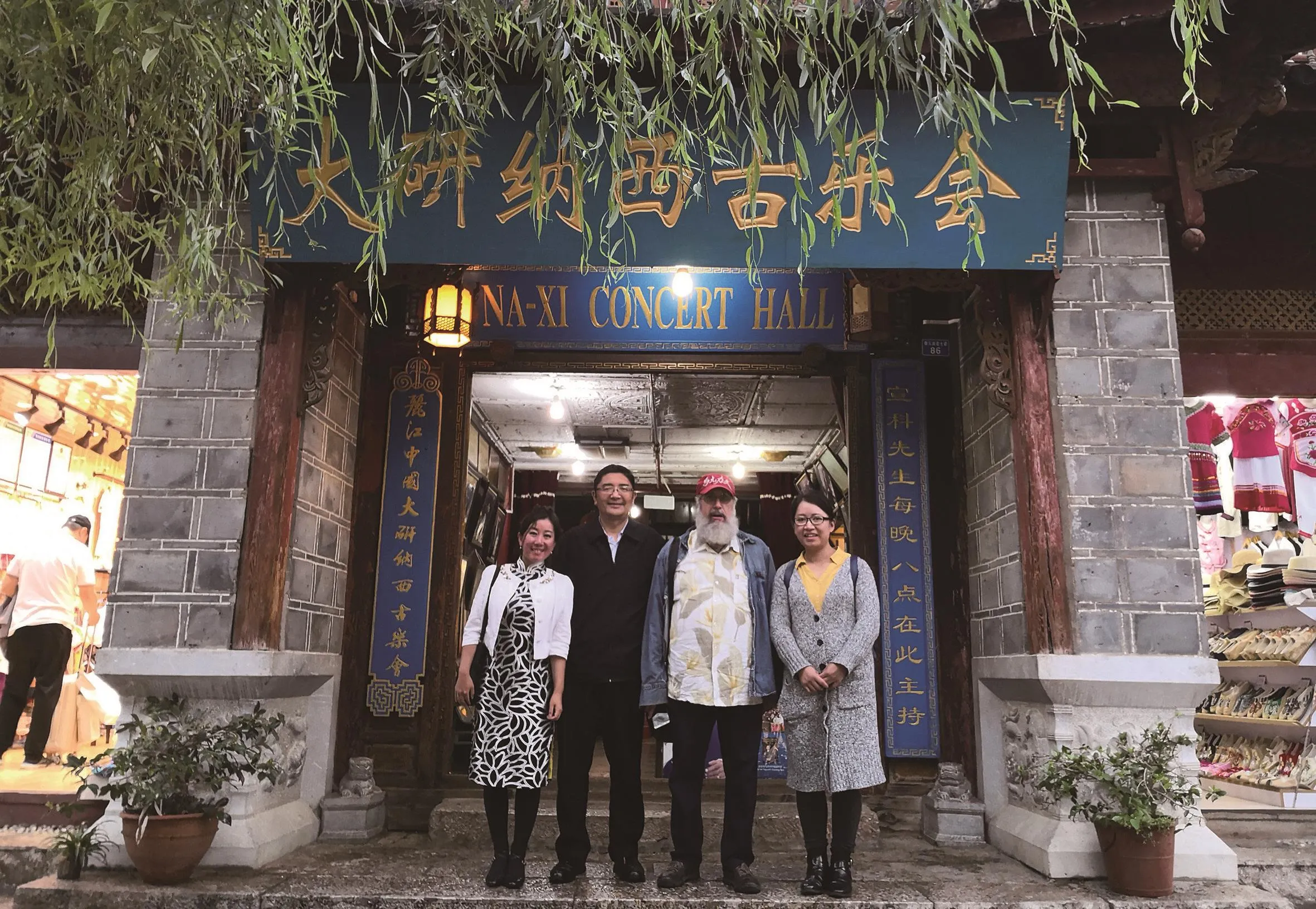为丽江谱新曲
2019-07-16马克力文MarkLevine史聪一
文/马克·力文(Mark Levine) 译/史聪一
“马克先生,您能为丽江谱歌一曲吗?”这一请求来自云南省国际关系办公室主任的阮朝奇先生。那是2017年8月8日,彼时,我正在出席 “2017年度高层次外国专家休假活动”的一个晚宴,阮先生恰好就坐在我的旁边。
本次休假活动由国家外国专家局(SAFEA)组织(注:2018年,科学技术部与国家外国专家局重组为新的科学技术部)。此行共有60名外国专家,我有幸成为其中的一员。而在这些专家中,不乏携配偶同行者,甚至还有一些专家的孩子也随行。与他们中的多数人不尽相同,我之所以收到邀约,是因为此前荣获了中国政府友谊奖的殊荣。
与本土歌手同唱当地民歌
在那次晚宴之上共有8—9桌,每桌有2位中国官员陪同,而阮先生便是列席者之一。对于诸多共同出席的外国人士,阮先生与其同事们都尽可能地去结识。因为当时正巧坐在他的左手边,于是阮先生便“从我开始”了。
在中国的56个民族(其中94%的人口为汉族,剩下的6%为其他55个少数民族)之中,仅云南一省内便有其中27个少数民族分布。以纳西族为主,共有22个少数民族生活在丽江这座古城周边。因此,对于我执教中央民族大学的身份,阮先生及其他与会嘉宾颇感兴趣。
除了谈及我的教学内容外,我还聊到了自己所创作的歌曲,其中有60余首与中国相关,我还向他介绍了我在中国的诸多巡演。阮先生于是问我能否为丽江谱歌一曲。我回应他:“我需要一些时间,但我乐意为之。”
在晚宴开始前,一位纳西族女歌手进行了简短的音乐演奏,即用纳西族方言演唱了数首当地民歌。阮先生对我说:“您也应该为我们大家登台献曲啊。”事实上,我也很希望能够与大家分享自己的音乐作品,但因为缺少吉他的伴奏,我有些犹豫。于是我说:“我的吉他不在身边!”“我们试试看能否帮您找到一把吉他。”于是,阮先生拨通了电话,并与他的一位同事平静地交谈起来。二十分钟过后,他对我说:“我们为您找到了一把吉他。”因为当天晚宴的举办地点正巧在我们所下榻酒店的二层,所以在晚宴的间歇,他安排同事向一位正在一层吧台休息的独奏吉他手借到了吉他。
随即,我来到隔壁的房间调试吉他,查看其调弦及音色状况是否正常。忽然,我听到有人在呼报我的名字,意识到他们正在对我进行入场前的介绍。于是,我随即登台,演奏了两首曲目。第一首歌曲便是绝大多数中国人耳熟能详的一首中国歌曲:《敢问路在何方》,这是电视连续剧《西游记》的主题曲,根据中国经典同名小说改编。而第二首是我早期所创作的一首曲目:《我可爱的亚洲双眸》。在第二首歌的演唱过程中,我有一段是用中文进行的,因为早在我十年前参加《星光大道》的时候,节目组便要求我对其中的一部分进行中文演唱。
演唱完毕后,我向阮先生表示自己还想再演唱两首中国云南风的歌曲。阮先生显得非常高兴。而当我表示自己要与纳西族歌手共同登台演唱时,阮先生越发欣喜。于是,在征得阮先生的同意后,我便走向纳西族女歌手,邀请她与我共同演唱歌曲,她也欣然应允。相比于观众们在独唱环节的积极回应,我们在双人合唱环节的表演则赢得了更多的赞许。对于我能够演唱当地歌曲,并且还能与当地歌手同台合唱的举动,地方官员们同样表现得异常高兴。无独有偶,许多在场的外国嘉宾与观众也同样对此次演出赞誉有加,有一些人甚至回应道:“终于明白您为什么能够赢得友谊奖这样的殊荣了!”
第二天,我们一行人去参观了当地的旅游景点,其中就包括著名的虎跳峡与玉龙雪山。当晚,我们所参观的最后一处景点便是丽江古城,以及闻名遐迩的纳西东巴文化博物馆剧场。对于剧场内的音乐演奏,我尤其喜欢,因为在两年前的丽江之旅中,我遗憾地与当时剧场的演奏擦肩而过。
作为大研纳西古乐会会长,宣科于1981年创立纳西族管弦乐团,旨在保护有“音乐活化石”之称的纳西族民乐。如今,纳西族管弦乐的表演已然成为丽江本地的标志性文化符号,并成为 “必不可少”的当地节目。
在此次剧场的参观过程中,我们有幸见到了宣科,他已有89岁高龄。但令人更为惊讶的事情远不止此,而是在这个约由15名音乐家所组成的乐团内,竟然有6位成员比宣科还要年长。出于身体原因,无论是在个人及乐团的详细介绍层面,还是在登台演出方面,宣科都受到了不同程度的制约,以至于在长达45分钟的演奏过程中,观众仅仅在开场阶段才能够目睹他本人显露身手的二胡演奏。宣科本人能够讲流利的英语,使我一度认为这是他在全球范围内巡回演出的过程中所练就的硬功夫。

作者(右二)在丽江了解纳西古乐
关于自创歌曲的投票逸事
行程结束后,我便启程返回北京。大约又过了一个月,我将《一个叫做丽江的地方》的歌词寄给了阮先生。在此之后,我便开始根据歌词对曲目进行创作。事实上,我一共为这首歌谱曲三首,每一首曲目在曲调与节奏上均不相同。这三首歌全部是我在住所内简单录制的,我也将它们一并寄给阮先生。他向我表示感谢,但却在而后近四个月的时间内杳无音讯。
时至2018年初春,云南省外事办的一位工作人员与我取得联系,并询问我是否有时间参加即将在6月举办的会议。会议致力于国际人才的沟通与交流,分议题可谓是五花八门。会议的发起点设定在云南省的省会昆明市,与会后我将启程前往丽江。就在此次会议开始前的一个月,阮先生再次与我取得联系,并直接告知我携带吉他前去参会。他表示,希望我能够出席此次会议,但对我的参会行程会另做安排:阮先生计划让我同丽江政府的相关代表进行会面,并希望我能够对《一个叫做丽江的地方》的三种不同版本进行演奏。他还希望我能够与政府代表进行相互协商,并从这三个选项中选出一个,作为这首歌的官方版本。
会议的开幕仪式在昆明如期举行,约有1000人出席,其中有近150名外国友人,而其余参会者均为中方的政府官员、商人及媒体代表。而在丽江,我更是受到了当地文化部门代表的热烈欢迎。在参观完丽江本地世袭家族的历史古宅后,我便返回下榻酒店,去出席一场关于这首歌曲的相关会议。
会面者有四名当地的纳西族音乐家与作曲人,三名丽江文化部门的工作人员,以及两名当地媒体的记者朋友——他们准备在《丽江日报》上对此次“历史性会晤”进行后续报道。除傅涵外,其他人均不懂英语,因此她对歌词内容向各方进行阐释,并为我们的讨论进行翻译。
我先介绍了歌曲,并对三首曲目歌词虽然相同,但却拥有三种不同的曲风进行了解释。随后,我对三种版本依次进行演奏:暂且设定编号为1、2和3。当演奏结束时,其中一位音乐家询问我是否能够对2再次演奏,而另一位音乐家则希望我能够对3再次进行演奏。
身为教师,我曾经有过十年的辩论团队教练经历,而在我演奏结束后,便随即进入了最为激烈的讨论环节。我充分感受到:这真是一场热烈的讨论。其中一位音乐家建议我将部分歌词进行翻译,并用纳西族方言进行演唱;而另外两位音乐家们则对此持否定意见,并肯定了英语歌词的必要性:他们表示这并非一首纳西族民歌,而是通过一位外国友人的视角对该地区的一种呈现,所以应该使用作词者的母语进行演唱;而最后一位音乐家则主张在演唱过程中加入纳西族乐器,但这同样也引起了其他人的拒绝与反驳。
最后,我们邀请在场的九人分别参与调查,请他们选出自己最喜欢的版本,并阐明缘由。于是乎,每个人的确选出了最喜爱的版本……但是,其中三位选择了版本1,三位选择了版本2——你猜对了,剩下的三位果然不约而同地选择了版本3。
对于他们而言,我这位外国友人为他们的城市(丽江)写歌作曲,并从歌曲中讲述丽江故事,是一件倍感欣喜的事情。最终,在众人的支持下,歌曲的三个版本全部得到保留,并且还赋予了我在各种不同场合根据情况进行演绎的权利。
再见宣科
毫无疑问,这一天的到来令人倍感兴奋。然而确切地讲,无论是这一天,还是这番激动的心情,都尚未画上句号。
我与傅涵同文化部门的工作人员共进晚餐。在此期间,尽快结束用餐的催促不绝于耳,但我本人对此却一头雾水。
我们一行人来到古城的边缘,在大约步行了十分钟后,便抵达了剧院。此时,距离演出开始还有半个小时,我正优哉地观望着剧场外的照片与标语,此时傅涵走上前来,通知我是时候进入剧场了。我好奇道:“这是为什么?我们足有半个小时的时间呢!”“宣科正等着见我们呢。”于我而言,这无疑是一个意料之外的惊喜。随后,我们便跟随着宣科女儿的脚步进入剧场,来到了一个由办公室与更衣间组合而成的地方——正是在这里,我们见到了宣科,以及几位与他合作的音乐人。
此前,我们与宣科因文化部门领导的引荐而相识。而在先前的访问活动中,我了解到宣科能够熟练地掌握英语,不需要任何人来担任翻译。在我看来,宣科能够做到这一切绝非因为其曾周游列国,而是另有原因。果不其然,我随后便得知:宣科的父亲是丽江第一位能够讲英语的本地人。至于宣科本人,则在童年时期求学于德国教会学校,并从那时起开始学习英文。
我向宣科介绍了自创的歌曲,同时对自己随行准备了歌词副本感到庆幸,并让宣科一并过目。在此期间,我特意提到了歌曲创作中与宣科及剧场有关的内容,能够感受到的是他本人的那份惬意与欣喜。
在大家探讨的过程中,我还提到了俄国作家顾彼得(Peter Goullart)的著作《被遗忘的王国》,因为我曾在其中了解了一些关于丽江的情况。在1942年至1949年间,顾彼得曾被中国工业合作社(Gung Ho,即工合组织)委派至丽江担任代表。听到这里,宣科显得十分高兴,因为他不仅和顾彼得是老相识,其父亲还曾在顾彼得身边担任秘书一职。他向我们讲述了一些关于顾彼得故居的事情,包括故居所处的位置,以及彼时那里的忙碌情形。
在《被遗忘的王国》一书中,顾彼得曾对丽江名称的由来做出如下解释:
在汉语中,丽江的字面含义为“美丽的河流”。而这一河段则被称为金沙江,也就是众所周知的长江(分流段),在其东西两段的冲刷下,形成了丽江环流,而丽江古城便坐落在这座冲积平原之上。无论从何处观望,丽江与古城的距离皆为25公里,但要抵达河流北部的环顶之处确需时日。因此,无论是对于这条河流本身,还是对这座古城而言,丽江(美丽的河流)这个名字都当之无愧。而与中国绝大多数城镇不同,城墙在丽江古城曾无处寻觅。而作为一个县城,丽江在人口稀少的云南省内却占据着广阔的地域。(马克·力文:1948年出生于美国洛杉矶,社会学博士、专栏作家、乡村音乐人,现任中央民族大学教授。2005年来中国,创作了许多反映中国的歌曲,并与傅涵成立“秀外慧中”音乐组合,2014年获中国政府友谊奖。)

“Mark, can you write a song about LiJiang?” This request is coming from Mr. Ruan Chaoqi, the Director of the Office of International Relations in Yunnan Province. It is August 8, 2017 and I am sitting next to him at a banquet on the first evening of the “Vacation of High-Level Foreign Experts in LiJiang 2017.”
The vacation has been organized by the State Administration of Foreign Experts Affairs (SAFEA) which is responsible for authorizing the employment of foreign experts in China. [NOTE:As of 2018, SAFEA has been incorporated into the Ministry of Science and Technology.] I am one of about 60 experts, some of whom are accompanied by their spouse and in a few instances,by their children. My invitation, as is the case with many others,the result of my having won the Chinese National Friendship Award.
Sing Local Song with Local Singer
At the banquet Mr. Ruan is one of two Chinese of ficials sitting at each of the 8-9 tables. He and his colleagues at each table are focused on getting to know the many foreigners at their tables.Sitting just to his left, he starts with me.
Of the 56 Chinese ethnic groups (the 94% majority Han and the 55 minorities), 27 can be found in Yunnan Province. Although the main minority in LiJiang is the Naxi, 22 of nationalities are present in or nearby this ancient city. As a result, Mr. Ruan and the others have particular interest in the fact that I teach at Minzu University.
In addition to talking about me teaching my introduction includes the fact that I have written nearly six dozen songs about China and I tell him of many performances around the country. Mr. Ruan’s response is the question I open with about writing a song about LiJiang. “I’ll need a little time, but I will be happy to write one.”
Near the beginning of the dinner, there is a brief musicalperformance by a Naxi woman singer who sings a couple local songs in the Naxi dialect. During this performance, Mr. Ruan says, “You should sing for us.” I am also interested sharing my music but generally hesitant to do so without being able to accompany my singing with my guitar. I note that “I do not have my guitar.” “Let me see if I can find you one.” He calls over and quietly speaks with one of his colleagues who returns about 20 minutes later to report that he had gotten me a guitar.Our dinner is on the second floor of the hotel where we are staying and he had arranged to borrow one from a solo guitarist who was on a break from his set playing in the empty bar on the first fl oor.
I go to an adjacent room to see the guitar and to check its tuning. Suddenly I hear my name and realize that I am being introduced. I come out and perform two songs. The first is a Chinese song that is familiar to most of the Chinese in attendance, “Gan Wen Lu Zai Hefang” which was the theme song from the TV show “Journey to the West” based on the classic Chinese novel of the same name. For my second song, I choose one of my early songs, “My Lovely Asian Eyes,” which includes one chorus that I sing in Chinese as was required when I sang it on the “Star Avenue” TV show almost a decade ago.
After singing these I speak to Mr. Ruan and tell him that I would like to sing two more Chinese songs, both of which are from Yunnan Province. He is happy to hear that and even happier when I tell him I would like to sing them with the Naxi singer. Getting his agreement, I approach the singer with my request and she agrees. While I got a positive response to my initial solo performance, the response to this duet was even greater. The local officials were very happy that I sang some local songs and did it with a local performer. Similarly, the foreigners were impressed and a few responded, “It is clear why you received the Friendship Award.”
The following day were toured some local scenic spots including Tiger Leaping Gorge and Jade Dragon Snow Mountain. That evening was topped off by a visit to the history LiJiang Old Town and the famous Naxi Museum Theater. I was particularly excited about the musical performance as this is something that I missed on my earlier visit to LiJiang two years earlier.
Xuan Ke President of the Dayan Naxi Music Association and founded the famous Naxi Orchestra in 1981 to protect the disappearing music that is known as “living music fossil.” Naxi Orchestra performances have become a trademark of Lijiang with their “must see” (and hear) program.
At the time of this visit to the theater, Xuan Ke is 89 years old.That was quite amazing, but even more amazing is that ofthe 15 or so musicians in the orchestra, there are six who are older than he is. Xuan Ke’s health limited his performance to presenting a detailed introduction of both himself and the orchestra and performing, on the er-hu, only on the opening number out of the 45-minute concert. He speaks in flawless English which at the time I believe was the result of his worldwide travel to perform.
A Polling for My Song
I return to Beijing after our tour and about a month later I send Mr. Ruan the lyrics to “A Place that’s Called LiJiang.” After that I work on melodies to go with the lyrics and actually come up with three versions that are different in key and tempo. I do a simple home recording of all three and send them to Mr. Ruan as well. He thanks me but I don’t hear any more from him for about four months.
In the early spring of 2018 I am contacted by a member of his staff in the provincial Foreign Affairs Office who asks about my availability to attend a conference that will be held in the June. The conference, focusing on the exchange of international personnel with a variety of subtopics, is to begin in the capital city of Kunming and then I will then go to LiJiang. A month or so before the conference is to begin Mr. Ruan contacts me directly and tells me to bring my guitar. He says that he wants me to attend this conference but there is something else that he has in mind. He is planning for me to meet with representativesfrom the LiJiang government and wants me to perform all three versions of “A Place That’s Called LiJiang.” He wants us to discuss them and decide which should be the of ficial version.
The initial meeting in Kunming sees about 1000 people in attendance. About 150 of these are foreigners and the rest are Chinese business people, government officials or media representatives. In LiJiang, we are greeted by representatives of the Culture Department of LiJiang. After a visit to the historic home of an old ruling family in LiJiang, we return to our hotel for the anticipated meeting about the song.
Gathered together are four local Naxi musicians/composers,three staff members from the LiJiang Culture Department and two local media personnel to report on this historic meeting which they did in a subsequent article in the LiJiang Daily newspaper. None of them speak English and Fu Han is there to both explain the lyrics of the song and interpret our discussion.I then introduce the song and explain that although the lyrics are the same, there are three different versions. I perform the three versions in sequence: 1, 2 and 3. When I am done, one of the musicians asks me to perform the second version again.Then another asks be to perform the third version again.
I have spent 10 years as a debate coach and teacher and what followed my performance was a most active debate between those who were there, with the musicians being the most activite participants. One suggested that I should translate part of the lyrics and sing it in the Naxi language. Two others disagree and say it should all be in English. They say, it is not a Naxi song but about the area through the eyes of a foreigner and it should also be through the foreigner’s words. Another musician suggests that we could add in a Naxi musical instrument, but that is rebutted and rejected by the others, as well.
We then do a polling of each of the nine attendees and ask them to identify which version they prefer and to give their reasons why. Everyone has a favorite BUT … three people preferred version 1, three people preferred version 2 and, yes, that means the remaining three preferred version 3.
They are all happy that this foreigner had written a song about their city and very pleased with the story that it tells. Finally,I was encouraged to keep all three and decide which I want to perform on each individual occasion.
Meet Xuan Ke Again
It is a most exciting day, but neither the day nor the excitement were over yet.Fu Han and I go for dinner with the Culture Department staff. I am told to eat quickly but I didn’t know why. We are supposed to hook up with the Director of the Culture Department and go to the Naxi Theater for a performance.What a great surprise!
We get to the edge of the Old Town and walk about ten minutes to the theater. We arrive 30 minutes before the performance and I am leisurely looking at the photos and the signs outside when Fu Han tells me that we have to go inside. I asked, “Why?We still have 30 minutes.” “Xuan Ke is waiting to meet us.”An even bigger surprise. We are taken into the theater by Xuan Ke’s daughter and led into a small combination of fice and dressing room where we see Xuan Ke and a few of his fellow musicians.We are introduced by the leader of the Culture Department. As I learned in my earlier visit Xuan Ke’s English was very good and no translator is required. My guess that this was do to his international travels was not the reason for this. Xu Ke explains that his father was the first Chinese English speaker in LiJiang and Xuan Ke, himself, had learned English as a child in a German missionary school.
I tell Xuan Ke about my song and hand him a copy of the lyrics which I fortunately still have on me after our meeting. I make note of the fact that I talk about him and the theater in the song and he is very pleased to hear that.
During the course of our discussion I also mention that I had learned some about LiJiang from having read famous book about the city called Forgotten Kingdom, by the Russian, Peter Goullart. From 1942 to 1949, Goullart was the representative of Chinese Industrial Cooperatives (Gung Ho) in LiJiang. Xuan Ke is also happy to hear this, not only because he knew Goullart but because his father was Goullart’s secretary. He tells us some about Goullart’s house, the location and what a busy place it used to be.
Peter Goullart gave an explanation of the meaning of the name of Lijiang in Forgotten Kingdom.
The name Lijiang means in Chinese the Beautiful River. This refers to the great River of the Golden Sand, more popularly known as the Yangtze, which fl ows to the west and east of the town and forms the vast loop in which Lijiang is situated. The river is only twenty-five miles from the city in either direction, but it takes days to reach the apex of the loop in the north. … The epithet Beautiful River was more than deserved by both the river and town. Unlike most Chinese cities,Lijiang had no wall. It was a large place as towns go in the sparsely populated Yunnan province.
「责任编辑:管贞」
